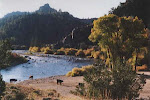


With news from the spill in the Gulf of Mexico oil rig getting worse [1]—a top Coast Guard official warned [2] it could end up being “one of the most significant oil spills in U.S. history”—questions are beginning to be asked about how it happened, and how it could have been prevented.
As The Wall Street Journal reported this morning, the oil rig lacked a device—known as an acoustic control—that would’ve served as a safeguard of last resort [3]. While the effectiveness of the $500,000 device is debated, the Journal points out that it is used by other oil-producing nations, including Brazil and Norway. Regulators in the U.S. were also considering requiring it a few years ago, but after industry objections decided that the devices were expensive and needed more study.
So which regulator oversees rigs and made that decision? It was the Department of Interior’s Minerals Management Service, an agency that has had a spotty record over the past few years.....continued......











 EXCERPT:
EXCERPT: